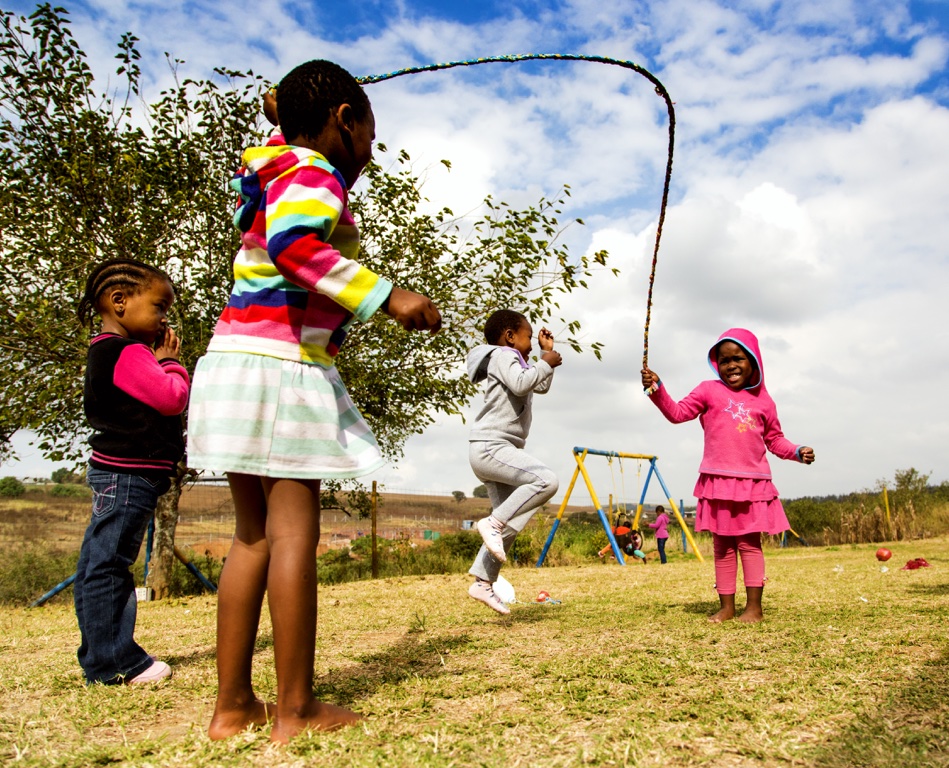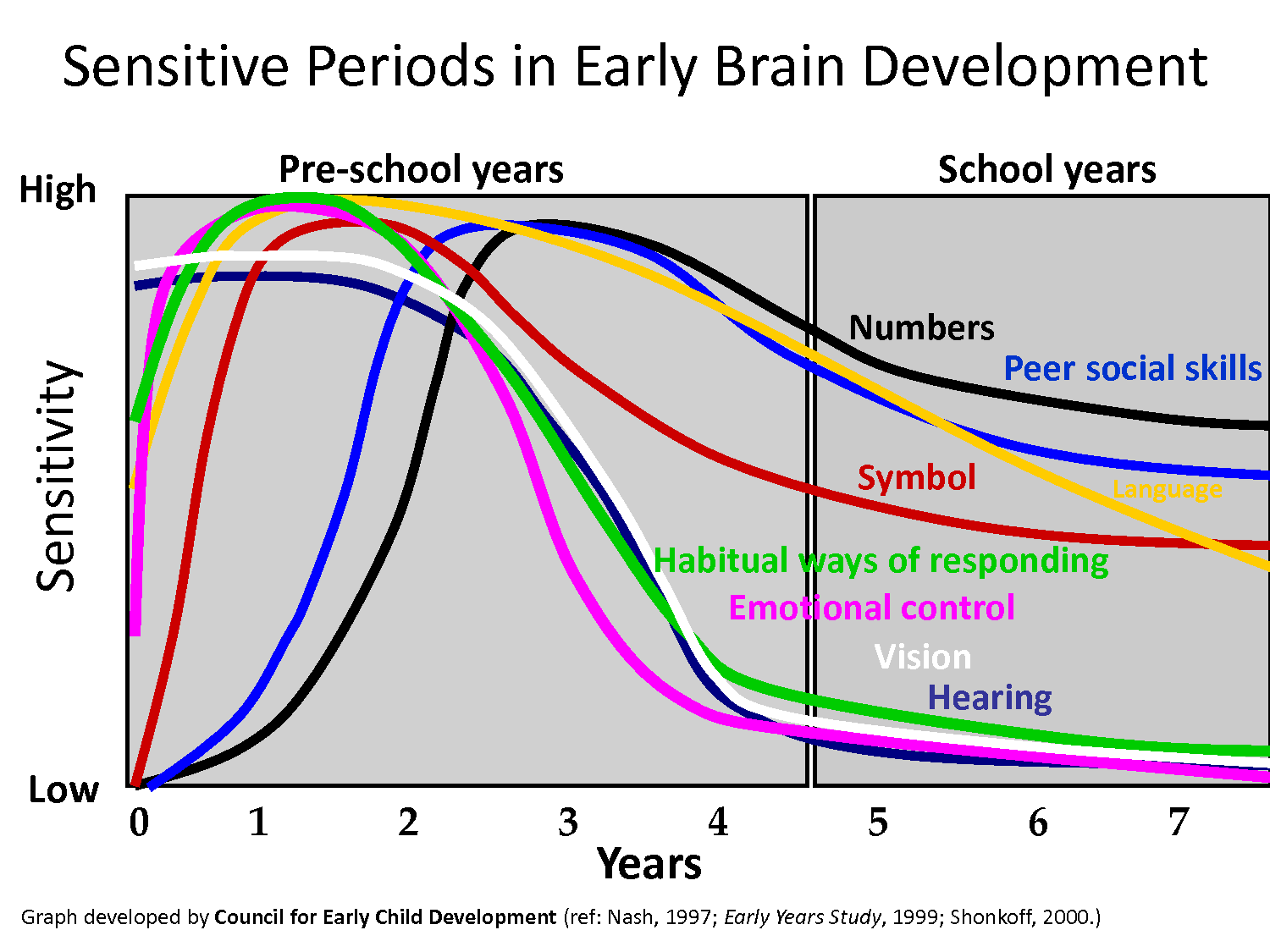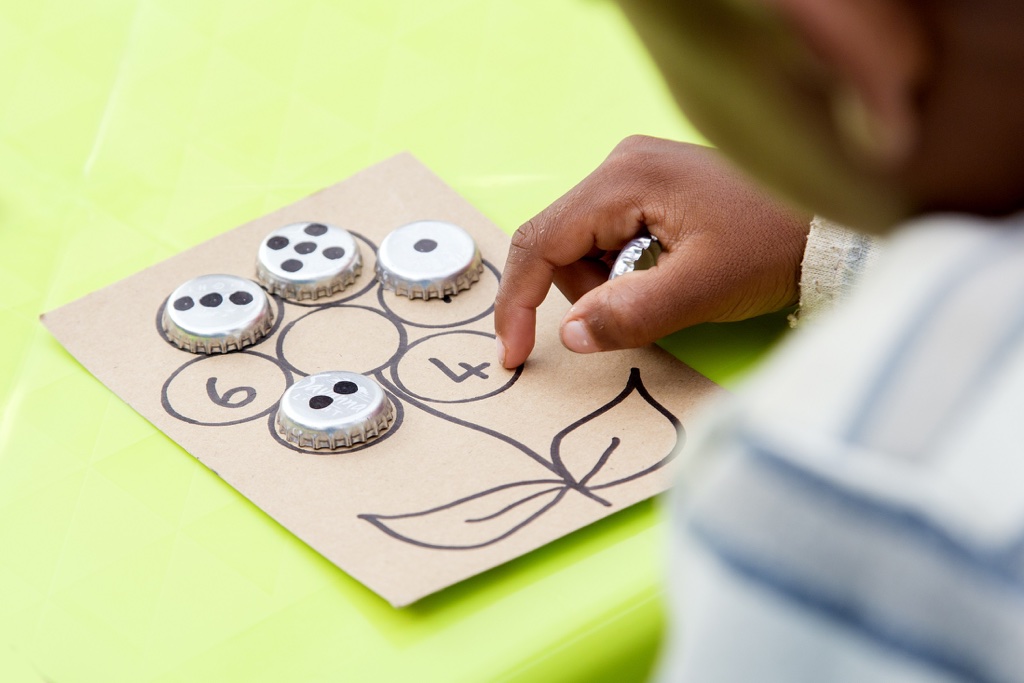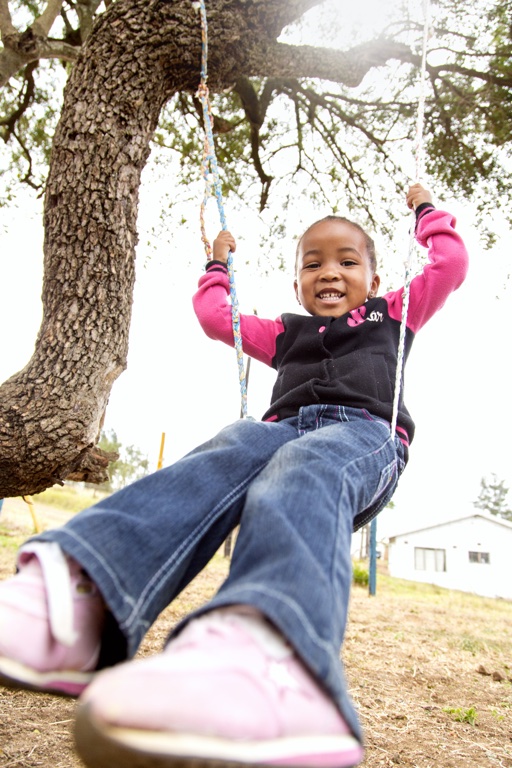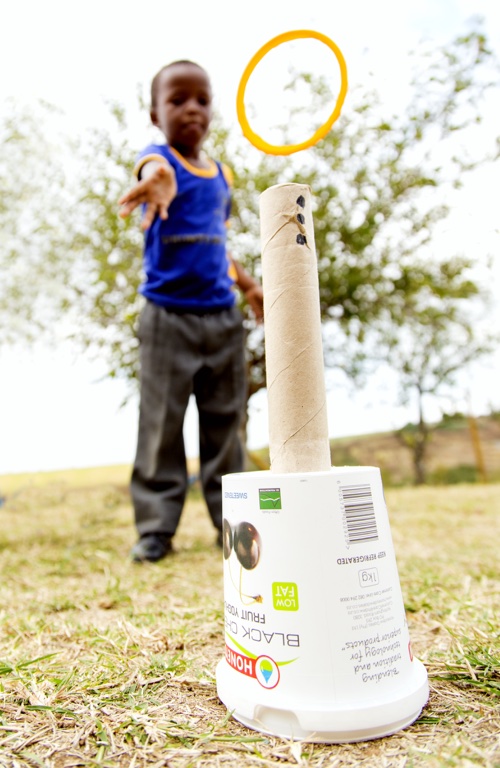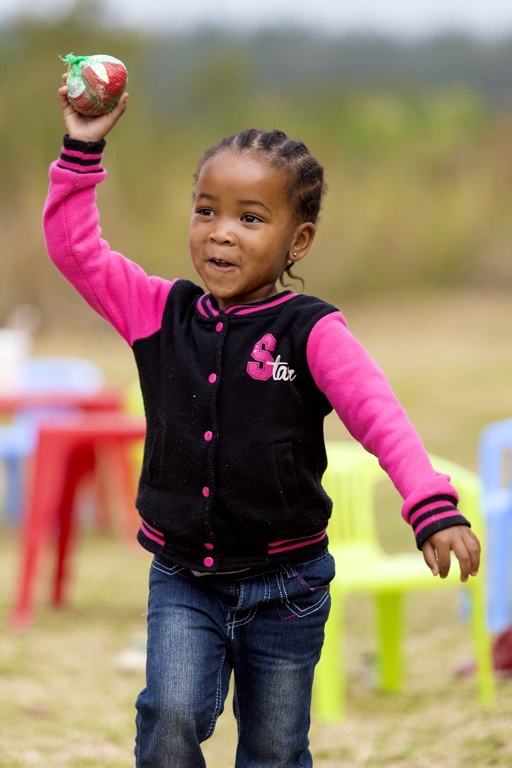Singakwenza, meaning “We can do it!”, is a non-profit organization which focuses on Early Childhood Education. With an emphasis on long-term sustainability, we provide grassroots training for practitioners, parents and caregivers in economically disadvantaged communities to enable them to provide fun, educational activities for their young children. These activities develop, through play, the foundational skills for learning, supported by educational resources that are handmade solely from recycling. Once the adults have been trained to provide daily stimulation for their young children, they are able to make all their own resources using household packaging that usually ends up in landfill, rivers and the ocean.
Singakwenza works to support and empower caregivers to create safe, loving and sustainable learning spaces for children and to up-skill them with the building blocks that underwrite and facilitate children’s ability to learn through play, know love and develop resilience. In so doing, children are empowered to reach their full potential and grow themselves out of poverty.
Research around the world has shown that the best way to break the poverty cycle is through education, but unfortunately our South African education system is in a crisis. More than half the children who start Grade 1 drop out of school before Matric, and a quarter of those who stay are unable to pass Matric. The “real” Matric pass rate for 2019 is estimated at 39% (News24, 8 Jan 2020).
Research around the world has shown that the best way to break the poverty cycle is through education, but unfortunately our South African education system is in a crisis. More than half the children who start Grade 1 drop out of school before Matric, and a quarter of those who stay are unable to pass Matric. The “real” Matric pass rate for 2019 is estimated at 39% (News24, 8 Jan 2020).
Almost 80% of the foundation upon which all further learning is built is developed in the first four years of life. As seen in the graph, some of the sensitive periods for brain development which are critical to educational success, peak in the pre-school years, including number, language and emotional control. Stimulation during these years determines potential for holistic development, and if these sensitive periods are not maximised, it makes it much more difficult to learn these same skills at a later stage. Most of this potential is built while a child is playing and exploring. Young children need many different opportunities to create the neural pathways and connections required for further learning.
SINGAKWENZA’S BOARD MEMBERS
Julie Hay
She taught for many years in the Junior Primary and Pre-Primary phases, before purchasing a Toptots Mother and Child franchise in July 2000.Her passion for Early Childhood Development (ECD) had an outlet in this programme, and Julie spent 10 years teaching mothers how to provide the stimulation necessary to help develop well-rounded children with a solid foundation for learning. Her dedication and enthusiasm helped her to be the top Franchisee in the country for a number of years. During this period, Julie became aware of the difference that the ECD programme was able to make to children who had many social, physical and financial advantages, and wanted to bring the advantages of this programme to children who were not so fortunate. She therefore sold her Toptots franchise in June 2010, and began developing an ECD programme that utilises recyclable materials as teaching aids. Julie has two children of her own, and much of her motivation with working in this field comes from her need to provide her children with an awareness of how many people there are in need and how they can help those less fortunate than themselves.
“It is a privilege for me to be a part of this programme. I can’t change the world, I can’t even change a whole town, but every child whose life is improved by what we do, makes what I am doing worthwhile.”
Kgashane Mohale Kgashane
worked for Anglo Gold as an Engineer and in 2002, obtained an MBA from instead, and joined South African Breweries, where he worked until 2008. He worked as a consultant for Training Leadership Consulting and has various other entrepreneurial ventures. Kgashane runs a Teen Mentoring Programme at a High School in Randburg called Sekolo sa borogo (SSB) in addition to the input he gives to the Singakwenza programme.
Reg Zammit
Reg followed a career in Industrial Relations and was appointed Group Personnel Manager of the Tongaat Hulett group and then worked as a Director of Commercial Products at Hulamin. In 1989, Reg left the corporate world to start his own business and successfully developed an export-based business along with a packaging company called Foodpak. In 2004, Reg sold his export business and retired to follow his passion of racing pigeons, and is currently Chairman of the Kwa-Zulu Natal, Racing Pigeon Combine. Reg has also served on the Board of St. John’s D.S.G for 23 years and for the past 10 years as Vice-Chairman. Reg brings his years of business experience and wisdom to Singakwenza.
“Singakwenza deals with all the pressing issues facing this country: HIV, strained Health Care Services, Education and Capacity Building. It is essential to run this organization diligently because we have a duty to roll out these programmes successfully”
Caroline Richter
is a true blue South African, a farmer’s kid and passionate about South Africa. She is the co-owner and editor of the Meander Chronicle newspaper – the only newspaper specialising in all the good news which abounds in the province of KwaZulu-Natal and the country.
“I am incredibly proud to be a part of Singakwenza. Having seen it at work makes me enormously optimistic about the future of South African children and naturally in the long term, the future leaders of this phenomenal country!”
Seelan Naidoo
With Your Help, We are Making The World a Better Place!
THE HISTORY OF SINGAKWENZA
Singakwenza was formed in 2010, when two friends, Julie Hay and Debbie McCarthy, decided to join their areas of expertise to create an organisation that would address, through training, two main issues facing many South Africans, namely Early Education and Health.
EDUCATION PROGRAM
Julie Hay, a qualified educator, taught for 11 years in the Junior Primary and Pre-Primary phases, before purchasing a Toptots Mother and Child franchise in July 2000. Her passion for Early Childhood Development (ECD) had an outlet in this program, and she spent 10 years teaching mothers how to provide the stimulation necessary to help develop well-rounded children with a solid foundation for learning. This passion helped her to be placed in the top five franchisees in the country for all 10 years, and first overall for three years. During this period, she became very aware of the difference that an ECD program was able to make to children who had many social, physical and financial advantages, and wanted to bring the benefits of early learning through play and exploration to children who were not so fortunate.
She therefore sold her franchise in June 2010, to launch an organisation that would reach economically disadvantaged children under the age of four in South Africa with a sustainable and meaningful program. This has allowed her to dedicate herself full-time to writing training material, lesson plans and workshop manuals, designing toys and teaching materials from household packaging, teaching and mentoring trainers, and supervising all staff to ensure that the Singakwenza vision is maintained.
PEER EDUCATION PROGRAM & MOBILE CLINIC
Debbie McCarthy’s company, Training Leadership Consulting, had been looking at ways that businesses that they worked with could address the effects of HIV in the workplace. In 2002, Debbie and Nondumiso Nzimande worked with Linzi Smith from Education, Training and Counselling, an expert in the field of HIV, to compile a comprehensive HIV Peer Education Programme in English and isiZulu. In order to provide treatment for the opportunistic diseases associated with being HIV positive, a Primary Health Care Mobile Clinic programme was started under the guidance and support of Ray Baker, the Director of Corporate Social Responsibility for Kingfisher in the UK. The clinic was funded by Kingfisher, and staff and medication were funded by the Department of Health. This programme was formalised as a non-profit organisation when Debbie and Julie launched Singakwenza in 2010.
CHANGES IN 2015
The key philosophy of Singakwenza is “Sustainable Change”. Sadly most of the sites that the Mobile Clinic was servicing were resistant to implementing the Peer Education Programme, which meant that the Mobile Clinic was merely providing a “band aid” for the symptoms of HIV and not treating the root cause. In addition, over the years, Primary Health Care became a key focus for the South African Department of Health (DoH), and by 2014, they were providing these clinics to most areas in the district. Therefore in 2015, the Singakwenza Board made a strategic decision to no longer provide the Peer Education and Mobile Clinic programmes, and instead to focus on educating children from a young age to make healthier choices. As per the agreement with the Department of Health, the Mobile Clinic was transferred to them and they continued providing the Primary Health Care service to the sites that Singakwenza had been servicing.

